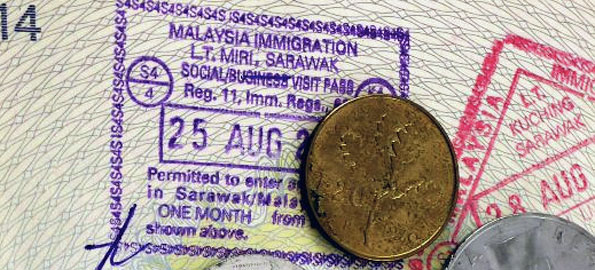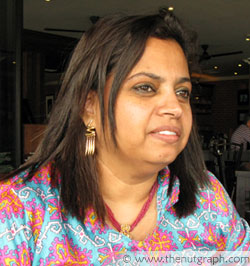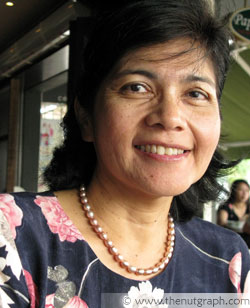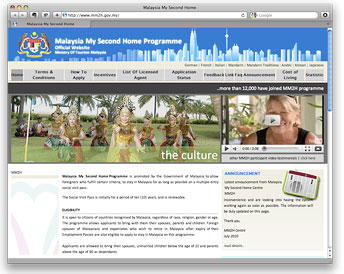| The long wait to be Malaysian: The foreign spouse experience |
 |
 |
| Friday, 06 August 2010 00:00 | |||
 BINA Ramanand and Asha Lim are just two among what is believed to be many more with a predicament because they live in Malaysia. They are foreign spouses married to Malaysians who have waited years and in some cases, decades, for their permanent residency (PR) applications to be approved. As of June 2010, the Home Ministry said 521 new applications were being processed by the Immigration Department. Between 2001 and 2009, the department also received and resolved 24,883 PR applications. What was not said, however, was whether “resolved” meant rejected or approved, and whether there were more pending applications that were made earlier. Bina and Asha are behind the informal Foreign Spouses’ Support Group (FSSG). Bina, from India, has been in Malaysia for 18 years, and raised two children aged 16 and 11. She is still on a social visit pass. Asha, from Singapore, has lived here 28 years and raised three children aged 23, 17 and 16. Asha was recently issued an entry permit which is the interim document before she can obtain her PR or red identity card (IC). FSSG began advocating for the rights of foreign spouses and children in 2007. It has teamed up with Wanita MCA, the MCA Citizenship Task Force, the Migration Working Group, and Women’s Aid Organisation to lobby for more streamlined procedures and to promote gender equality in PR and citizenship policies. In an interview with The Nut Graph on 30 July 2010 in Puchong, they talk about the government’s arbitrary and discriminatory policies and its bureaucratic inefficiency. They also explain how this combination of government policy and inaction are hardest on non-citizen spouses from the lower income and non-professional group, and on spouses in abusive relationships. TNG: What are some difficulties of living life here without PR status? 
Bina Ramanand
Without PR, we are treated like foreigners and not as part of our Malaysian families. We have to carry our passports around, while expatriates, foreign students and foreign domestic helpers get identity cards. Without PR, we are unable to co-own property. We are subject to foreign investment rulings whereby there used to be a RM400,000 minimum restriction on property purchased by foreigners. Today, the restriction is lower. But it shows the bias towards wealthy or rich foreigners. Not every foreign spouse here lives like an expatriate. Nor is every foreign woman involved in vice as newspapers often depict. Another aspect is health care. I once had the distressing experience of not being able to admit my child into emergency, because I am on a passport. As foreigners, we pay double charges at government hospitals and to deliver our Malaysian babies. Having PR status is so important especially for estranged or divorced foreign spouses. A foreign wife has to have her husband as the sponsor for her PR application. If she wants to work, she requires a letter from her Malaysian spouse granting her permission to work. It is for want of this letter that estranged and widowed spouses are unable to get a work endorsement from Immigration. But if she is separated or divorced, how is her husband going to sponsor her? How will she be entitled to work and to provide for her Malaysian family? Foreign wives without PR who suffer domestic violence are stuck with the abuse and are also vulnerable to deportation because they are at their husband’s mercy, unless they can find another sponsor with an income of above RM2,000. What makes applying for PR so difficult? Please outline the hurdles for readers to get a fuller sense of what foreign spouses go through. Bina: Let’s talk about what happens even before one qualifies to apply for PR. First, for foreign wives, you have to have lived here for five consecutive years. For foreign husbands, ten years. You live here as a spouse on a long-term social visit pass. Asha Lim: The clock for the five consecutive years only starts ticking when Immigration issues you a one-year social visit pass, to be renewed for the next five years. The three-month or six-month pass you get when you first enter doesn’t count as part of the five years. It is time wasted. And during the five consecutive years, you cannot start the PR application process. You must wait until the five years are over. In other countries, foreign spouses obtain PR within the first five years. Bina: After the five years, you may apply, but until we actually receive PR, our spouses have to be present with us at Immigration every time we renew our social visit pass. Our spouse has to take leave from work. And if you don’t have child minders, you bring along the children, so we go with crying babies in our arms and young kids to wait a whole day. It is very disruptive to family life. To apply for PR, you submit numerous forms. They include copies of old passports of all members of the entire family and your wedding invitation. I had been married for 15 years, where on earth was I going to fish out the invitation from? They also want wedding photos as proof, birth certificates, education certificates, and more. My experience includes being told to apply at the state immigration office of my husbands’ home address in his IC. So we went to the Perak immigration, where we were told to go back to Kuala Lumpur since the files had to be sent from Perak back to KL. Back in KL, at Pusat Damansara, we were told that the forms were out of print! 
Do our immigration offices require better printers?
I was informed in December 2009 that my application for PR has been approved. But I still have to wait for the letter for it to be official. To date, more than six months later, I still haven’t received the letter. It shouldn’t take this long to print a letter, should it? So, basically, it is first a wait of five years to get the PR application form. After applying, there’s another long wait for approval, then another wait for the official letter, followed by another wait for the entry permit, which you need first in order to get PR or the red IC. What is the process like if a foreign spouse wants to work? Bina: On my current social visit pass, I have an endorsement to work from Immigration. To get it, one needs an appointment letter from the employer, and a letter from our Malaysian spouse giving us permission to work! I am not sure how they apply this to foreign husbands married to Malaysian women. Up until October 2008, foreign spouses could only work in companies which had a paid-up capital of RM250,000 and above. Not all foreign spouses are professionals and some of them just want to supplement the family income. This restriction has [since] been removed and this has helped to make finding work a bit easier. But it remains difficult especially for estranged or divorced foreign spouses. I have come across a case where an employer wanted to help a widowed foreign spouse with a child and the employer got remanded for hiring a foreigner without a work permit. Who would want to employ a widowed spouse and how is she supposed to care for her Malaysian children or dependents such as in-laws? But in this case the widow has since been informed that [the Home Minister has given her a special approval], so it is heartening that such cases come within the minister’s purview. It is far easier and faster with an expatriate visa and even for domestic helpers to renew their work permits. Many of us who are still waiting for PR came here in the late 1980s and early 1990s. We have lost the prime of our lives and missed opportunities for work while waiting. In the end, it is our Malaysian families who are deprived of a better standard of living. 
Asha Lim
Why can’t foreign spouses here be measured for the value they bring to Malaysia? We act as ambassadors for Malaysia to our extended families; we bring in tourism dollars when our relatives come to visit us. We bring our funds and savings from our countries of origin to contribute to our families and the economy here. Are there differences in the problems for male and female foreign spouses? Bina: Yes indeed, male spouses have problems too. The 10-year requirement for continuous residency before they can qualify to apply for PR being one of them. In some cases, applications by foreign husbands are rejected right away while foreign wives are given more consideration. The non-citizen husband has additional requirements to fulfill to get a social visit pass that doesn’t apply to a foreign wife. These include proof of a minimum of six months of marriage, and proof of employment, or of a sponsor who earns above RM2,000. The conditions for citizenship for foreign wives are also not extended to non-citizen husbands of Malaysian women. Husbands need to continuously reside here for another 10 years, or 20 years in total, just to apply for citizenship. For non-citizen wives it is a total of seven years continuous residence, according to Article 15(1) of the Federal Constitution. Our support group consists largely of wives. I think many foreign husbands find the wait too long and uncertain and it is easier to take their families and leave. Has anyone ever given you a reasonable explanation as to why the government is so slow in handling applications? Bina: Shouldn’t this question be answered by the leaders, probably they have a reason for this policy? The beneficiaries of foreign spouses are their Malaysian families and the country. Income earned by foreign spouses will be spent in the country on property and other assets that will remain in the country and promote economic growth. I sold my property in India to buy property in Malaysia. If you add the human aspect and the number of Malaysians who are impacted, shouldn’t foreign spouses be at the top of the list to receive PR? 
Screenshot of Malaysia My Second Home's website
If you talk about brain drain, I personally know more than 20 people who have left the country who were mostly professionals, doctors and engineers, because the policies were really difficult on their spouses. Source: http://national-express-malaysia.blogspot.com/2010/08/long-wait-to-be-malaysian-foreign.html Add this page to your favorite Social Bookmarking websites
|
Latest News or Updates
- Discontinuation of The Reduction Of Fixed Deposit Placement Based On Property Purchase And MM2H Approval By Government Pension
- MM2H Agents Association Second National Workshop 2015
- MM2H Centre Does NOT Provide Photocopy Services
- Commissioner of Oaths Are NOT Allowed to Certify Documents
- MM2H Centre Closed on 17th July 2015
- MM2H Participants Are NOT Allowed To Do Business
- MM2H Centre Closed on 1st & 4th May 2015
- Exodus (MM2H) SB Offical Takeover Paradise (MM2H) SB and Promoteglad (MM2H) SB (Formerly know as Glamour Glad (MM2H) SB)
- Ministry of Finance (MOF): No Goods & Services Tax (GST) Exemption for Vehicle Purchase
- MM2H Agents Association National Workshop 2015












